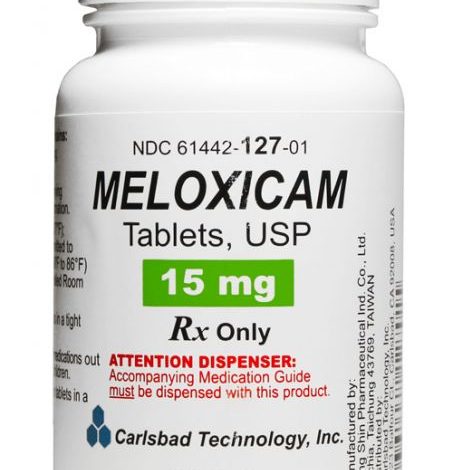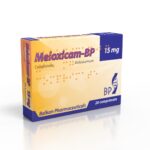What Is The Best Time To Take Meloxicam 15mg & 7.5 mg?

When a person picks up a new prescription, the pharmacist usually has a few key pieces of instruction about the medication. Often, the medication timing is among these directions.
Most patients want prescriptions to be effective. Some medications work more effectively when taken at specific times. For example, one study found that taking blood pressure medication at night instead of in the morning can cut the risk of stroke or heart failure in half. Why? Researchers found that high blood pressure during sleep can be a significant risk factor for mortality. Taking the necessary medication before bedtime helps provide better blood pressure control during sleep. The findings are significant; still, the key is to take any medication consistently, whether that’s morning or night.
In contrast, some prescriptions work best in the morning. In most cases, this is because taking medicines before breakfast can improve absorption. For example, some osteoporosis medications should be taken at least 30 minutes before eating or drinking anything. Other drugs, like antidepressants called selective serotonin reuptake inhibitors (SSRIs), can interfere with sleep cycles and should not be taken at nighttime.
What is meloxicam?
Meloxicam is a prescription drug. It comes in three forms: an oral tablet, an injection, and an oral capsule. Meloxicam oral tablet is available as the brand-name drug Mobic.
Meloxicam oral tablet is also available as a generic drug. Generic drugs usually cost less than the brand-name version. In some cases, they may not be available in all strengths or forms as the brand-name drug.
Why it’s used
Meloxicam decreases inflammation and pain. It’s approved to treat:
• osteoarthritis
• rheumatoid arthritis
• juvenile idiopathic arthritis (JIA) in children ages 2 years and older.
How it works
Meloxicam belongs to a class of drugs called nonsteroidal anti-inflammatory drugs (NSAIDs). NSAIDs help reduce pain, inflammation, and fever.
It isn’t known how this medication works to decrease pain. It may help reduce swelling by lowering levels of prostaglandin, a hormone-like substance that usually causes inflammation.
How should meloxicam be used?
Meloxicam comes as a tablet and suspension (liquid) to take by mouth. It is usually taken once a day with or without food. Take meloxicam at the same time every day.
Typical dosing for meloxicam (Mobic)
Tablets
Rheumatoid arthritis and osteoarthritis: Take 7.5 mg to 15 mg by mouth once a day. Do not take more than 15 mg a day.
Juvenile rheumatoid arthritis: Take 7.5 mg by mouth once a day. Do not take more than 7.5 mg a day.
Capsules
Rheumatoid arthritis and osteoarthritis: Take 5 mg to 10 mg by mouth once a day. Do not take more than 10 mg a day.
Follow the directions on your prescription label carefully, and ask your doctor or pharmacist to explain any part you do not understand. Take meloxicam exactly as directed. Do not take more or less of it or take it more often than prescribed by your doctor.
Shake the suspension well before each use to mix the medication evenly. The maximum recommended daily oral dose of meloxicam is 15 mg. Meloxicam may be taken without regard to the timing of meals.
What Is The Best Time To Take Meloxicam 15mg?
The best time to take meloxicam 15mg or 7.5mg is during the daytime. According to a new study published in the journal Scientific Reports, using NSAIDs like meloxicam 15mg during the daytime might be preferable to taking them at night (such as before bed).
This preliminary finding comes from a study that compared the effects of NSAID timing on pain and post-operative healing in 16 mice who had tibia (shinbone) fracture surgery.
In the study, mice were randomly assigned to two groups: One group was given NSAID injections during rest periods every day for three days following surgery (akin to taking medication at night); the other received the same NSAID dose for the same period but it was administered at a time of day when the mice would normally be active (akin to taking medication during the day).
Two weeks after surgery, the mice that had received NSAIDs during the active part of their day had returned to putting weight on the affected limb, whereas “mice treated during the resting phase still showed slower recovery,” the authors wrote.
Results from the study suggest that taking NSAIDs like meloxicam 15mg during daily activity period results in better postoperative healing and recovery in a bone surgery model. This is likely due to the impact of NSAID timing on inflammation at the healing site, especially through the overexpression of circadian clock genes such as Per2.
What are the likely side effects of meloxicam 15mg?
Meloxicam 15mg may cause side effects. Tell your doctor if any of these symptoms are severe or do not go away:
• constipation
• diarrhea
• gas
• sore throat
Some side effects can be serious. If you experience any of the following symptoms, call your doctor immediately. Do not take any more meloxicam until you speak to your doctor:
• back pain
• blisters
• cloudy, discolored, or bloody urine
• difficult or painful urination
• difficulty breathing or swallowing
• fast heartbeat
• fever
• flu-like symptoms
• hives
• hoarseness
• itching
• lack of energy
• nausea
• pain in the right upper part of the stomach
• pale skin
• rash
• shortness of breath or difficulty breathing
• skin blisters or peeling
• swelling in the abdomen, ankles, feet, or legs
• swelling of the eyes, face, tongue, lips, or throat
• unexplained weight gain,
• yellowing of the skin or eyes
Meloxicam 15mg may cause other side effects. Call your doctor if you have any unusual problems while taking this medication.
If you experience a serious side effect, you or your doctor may send a report to the Food and Drug Administration’s (FDA) MedWatch Adverse Event Reporting program online (http://www.fda.gov/Safety/MedWatch) or by phone (1-800-332-1088).





